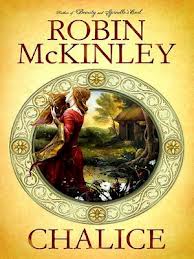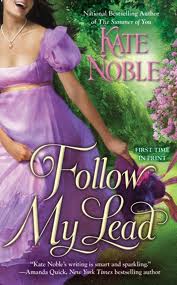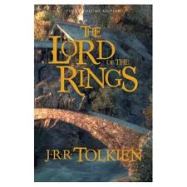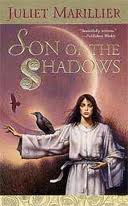 As far as my reading goes, there hasn’t been much of it, unfortunately. Endless feedings and lack of sleep have made me more receptive to reruns of Hoarders than to reading, but I’m getting back into it. I did just finish the second book in Juliet Marillier’s Sevenwaters series, Son of the Shadows. Honestly, why is she such a fantastic writer? She’s the kind of author that could make the back of a cereal box mysterious and moody. It’s been about a year since I read the first in the series, Daughter of the Forest, which is brilliant and lovely, and I instantly was catapulted into Marillier’s world of fairy tale retellings, strong heroines, and beautiful atmosphere. Seriously, if you love fairy tales or well-written fantasy, try this series.
As far as my reading goes, there hasn’t been much of it, unfortunately. Endless feedings and lack of sleep have made me more receptive to reruns of Hoarders than to reading, but I’m getting back into it. I did just finish the second book in Juliet Marillier’s Sevenwaters series, Son of the Shadows. Honestly, why is she such a fantastic writer? She’s the kind of author that could make the back of a cereal box mysterious and moody. It’s been about a year since I read the first in the series, Daughter of the Forest, which is brilliant and lovely, and I instantly was catapulted into Marillier’s world of fairy tale retellings, strong heroines, and beautiful atmosphere. Seriously, if you love fairy tales or well-written fantasy, try this series.
I’m back! Plus, a (very) mini-review
3 JanWhere I’ve been…
12 SepHello all,
I just wanted to post a quick note explaining my absence these past couple weeks, and excusing myself for the upcoming few weeks as well. My baby finally arrived in early September! It was a bit of a surprise as he came three weeks early, but we’re all doing well and I’m trying my best to adjust to new mommyhood. I’ll be back soonish, as soon as I have time to focus on anything other than feeding, sleeping, burping, and poop. 🙂
Chalice by Robin McKinley
20 AugWhile reading Chalice, I became aware that I had read this book previously, but I have no idea how long ago. I got that weird deja vu feeling, you know? But no matter, because I clearly didn’t remember details or the ending – huzzah! Chalice is technically classified as YA for grade 9 and up, but I think McKinley’s writing and ideas are sophisticated enough to be considered as completely satisfying for adults as well. (Please don’t misunderstand me – I read a ton of YA and don’t feel like there needs to be a distinction between young adult and adult books 99% of the time. Good writing is good writing, no matter what age it’s intended for.) Chalice refers to the ceremonial role that our heroine, Mirasol, fills in her kingdom. Once a beekeeper and woodskeeper, Mirasol was inexplicably chosen to fill the role of Chalice after the previous Chalice, along with the previous Master, had died in a fire. She is untrained, alone, and incredibly overwhelmed by her new position, the loss of her former life, and the aching despair she feels in her land. As a member of an “old” family and the Chalice, Mirasol can hear the earthlines of the land, magical currents that speak to the health and vitality of the country. Together with the rest of the ceremonial Circle, led by the Master, they must heal their country or watch it fall into the hands of the Overlord. Adding to her difficulties, the new Master has been called back from his indoctrination to Fire Priesthood and is barely human any longer. Mirasol and the new Master must learn how to fill their new roles, heal their land, and maneuver through the political and magical difficulties of their situation.
Phew, that was a long summary. Honestly, it’s so hard to sum up everything that’s going on in this novel, which in actuality doesn’t have an amazingly fast-paced plot. It’s more like Mirasol and the Master are both in incredibly difficult and complicated circumstances with SO MUCH riding on their success. McKinley does a fantastic job communicating the pressure Mirasol feels and takes a slow, methodical pace in exploring those feelings and their ramifications. It’s incredibly mature in that way – emphasis isn’t placed on exciting plot developments, but more on the discovery of oneself and the responsibilities all of us have to face at times before we’re ready. I read a review of this book that mentions it’s connection to Beauty and the Beast, and I can see that a bit. The Master is perceived as a bit of a “beast” in that he’s not quite human anymore. But I really felt like the relationship between the Master and Mirasol took a backseat to the discussion and exploration of the connection between human beings and the land and both the pleasure and the pain of tradition and duty. I’m trying to put my finger on why it didn’t satisfy me as completely as some of her other books have, such as The Hero and the Crown or Beauty. Maybe because the ratio of introspection to action was a little too heavily weighted toward introspection? I think I found the last quarter of the book a little slow, and then the ending tied everything up so neatly and quickly that I felt it was a little…easy. That’s a small gripe overall though; I really enjoy McKinley’s writing style and her ideas. I have a couple more of her books to read – I’ve never read Sunshine, surprisingly, and she has a newer book called Pegasus out now. I can’t even remember what a pegasus is – is it a unicorn that flies? Anyway, time for me to track that one down to find out!
Harry Potter the third
14 AugNow, on to the third installment in JK Rowling’s world-famous Harry Potter series. My leisurely re-read of the series was suggested to me and it was a fabulous idea. Clearly, my friend is a genius. The Prisoner of Azkaban seemed to stand out in my memory as my favorite of the series, and with good reason: it introduced Sirius Black. I lurve Sirius. He is an awesome, awesome character, so seemingly sinister but with a heart of gold. And can I just say: Gary Oldman? Just…magnifico! Perfect casting choice, movie peeps. Plus, I think this may be the last book where Harry, Ron, and Hermione are just kids. Is it the fourth book where teenage hormones come into play and Harry in particular starts acting like a little, pubescent snot? God, I’m old – I don’t identify with the kids anymore.
In The Prisoner of Azkaban, Harry faces a threat besides the most evil of evil, Lord Voldemort. Sirius Black has escaped from the infamous wizarding prison Azkaban and is being hunted down by dementors, sort of ghostly, tall things that sucks all the happiness out of you and can even steal your soul. Yikes. What Harry finds out pretty quickly is that Sirius was his father’s best friend and was imprisoned for killing 13 people after his allegiance to Voldemort was discovered. Also, he betrayed Harry’s parents and was the reason Voldemort was able to find them and kill them in the first place. Poor Harry must live under the onus of being stalked by one of the most dangerous criminals the wizarding world has ever known, all while striving to win Quidditch matches, sneak into Hogsmeade, pass exams, and just generally survive his third year at Hogwarts.
I do love this one. You get to learn a ton of backstory about Harry’s father and his three best friends, which is always fun because you get some Hogwarts history and learn more about the vast world JK Rowling has built up around Harry. Rowling is masterful at weaving subplots into the whole, so Professor Snape’s character also is illuminated while Harry has adventures with the Marauder’s Map and Whomping Willow. You always get the sense that she’s building to a crescendo, and that no detail or backstory is trivial or unnecessary. Snape is just so venemous and, well, mean most of the time, but in this third book you start to get an idea of why he holds such a grudge against Harry. Draco is just as horrible as ever, and Hagrid just as good-natured and bumbling. And I don’t want to give anything away to the 2 people worldwide who have yet to read this book or watch the movie, but something good (in a “family” way) happens for Harry and my heart just melted for him. More please!
Tinker by Wen Spencer
2 Aug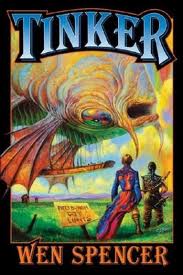 I love it when this happens and I hate it when this happens: after finishing Wen Spencer’s Tinker, I knew I’d found another “repeat” author (where you’re immediately interested in any book they write because you trust that the author will entertain you). The bad part? I’ve looked at Spencer’s backlog and nothing else is really grabbing me. Bummer, right? Tinker is the first in the Elfhome series, of which there are three or four now, I believe. So immediately, I should have two more to read, but here’s a secret about me. I rarely like series – it takes A LOT to get me to move on from the original book I fell in love with and allow the characters to change, grow, form new relationships. I know, it’s weird. It’s like, when I find a story I love, I want it to just stay frozen in time forever so I can revisit it without any surprises. Of course, I have exceptions: Both The Lord of the Rings and the Harry Potter series bring me delight in each book. Now that I’m thinking about it, this might just be a problem for me when a) there’s a romantic relationship in the book, and b) when I like the book more because of the characters than for the plot or setting. Yes, I think that’s it. When it’s the author’s voice that I love, or the universe they’ve created (not just in SF/F, but all fiction), or the feelings they evoke, I don’t have that weird, obsessive attachment to the characters remaining unchanged and unspoiled (in my mind). Wow, clearly I don’t like change.
I love it when this happens and I hate it when this happens: after finishing Wen Spencer’s Tinker, I knew I’d found another “repeat” author (where you’re immediately interested in any book they write because you trust that the author will entertain you). The bad part? I’ve looked at Spencer’s backlog and nothing else is really grabbing me. Bummer, right? Tinker is the first in the Elfhome series, of which there are three or four now, I believe. So immediately, I should have two more to read, but here’s a secret about me. I rarely like series – it takes A LOT to get me to move on from the original book I fell in love with and allow the characters to change, grow, form new relationships. I know, it’s weird. It’s like, when I find a story I love, I want it to just stay frozen in time forever so I can revisit it without any surprises. Of course, I have exceptions: Both The Lord of the Rings and the Harry Potter series bring me delight in each book. Now that I’m thinking about it, this might just be a problem for me when a) there’s a romantic relationship in the book, and b) when I like the book more because of the characters than for the plot or setting. Yes, I think that’s it. When it’s the author’s voice that I love, or the universe they’ve created (not just in SF/F, but all fiction), or the feelings they evoke, I don’t have that weird, obsessive attachment to the characters remaining unchanged and unspoiled (in my mind). Wow, clearly I don’t like change.
Okay, enough exploration about why I need therapy and on to the book! Tinker centers on Tinker, a brilliant inventor who lives on a salvage lot in Pittsburgh and messes with magical gadgets in her off-time. This alternate Pittsburgh is a part of Elfhome, a magical fairy realm exposed by a portal invented by Tinker’s own father. Whereas magic doesn’t exist in the “regular” world, anyone can encounter it in Elfhome. When an elven lord seeks refuge in her salvage lot from an assassination attempt, Tinker gets pulled into the political machinations and intrigues of the elven court and fairy governmental agencies. There is tons of action, with lots of dramatic escapes, along with a fair amount of romantic flirtation between Tinker and her rescued elven lord, Windwolf. Bits of fantasy and sci-fi intermingle here, and there was just enough of each to keep me fascinated.
The world-building here is extremely intricate and detailed, and I’m not gonna lie, sometimes I got lost. But more in a “man, I need to read more so I can understand this” kind of lost. I just loved the originality of this book – I honestly haven’t read anything quite like it before. The romantic development between Tinker and Windwolf was an obvious treat for me, since I am a sucker for any kind of love story, though there was a potential love triangle situation, which is dreaded and loathed by me at all times. I just….don’t like it. Never have. How can I truly believe that two characters are meant for each other when a third character poses a real appeal? Also, I just really liked spending time with Tinker – she’s not overly smartass in that annoying urban fantasy heroine way, but she does have flaws. Real, human flaws, the kind that make you shake your head at her rather than throw the book across the room in annoyance. Spencer has another series, the Ukiah Oregon series, that’s highly regarded – maybe I should just take a leap of faith and try it?
The Translator by Leila Aboulela
16 Jul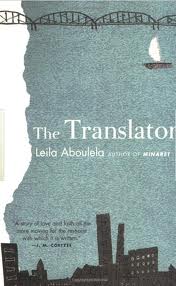 I just finished this book twenty minutes ago and I feel like I need to immediately write up my thoughts on it, as it’s one of those ephemeral, unusual books that I might lose the details of as time goes on. It took me a little longer than usual to get into this book, I think because the themes of exile and alienation worked a little too well on me at first. The book seemed, well…..sad and a little grim. That’s okay, but it’s not necessarily something I jump to pick up, you know what I mean? But given time, the book opened right up for me – the characters are so human and real and relatable, and I LOVED the exploration of loneliness, doubt, and faith, both in yourself and religion.
I just finished this book twenty minutes ago and I feel like I need to immediately write up my thoughts on it, as it’s one of those ephemeral, unusual books that I might lose the details of as time goes on. It took me a little longer than usual to get into this book, I think because the themes of exile and alienation worked a little too well on me at first. The book seemed, well…..sad and a little grim. That’s okay, but it’s not necessarily something I jump to pick up, you know what I mean? But given time, the book opened right up for me – the characters are so human and real and relatable, and I LOVED the exploration of loneliness, doubt, and faith, both in yourself and religion.
Sammar is a widow from Sudan living in Aberdeen, Scotland and working as an Arabic translator at the university. When the book begins, Sammar has been living within a numbing bubble of grief for her husband Tarig, who was killed in a car accident four years earlier in Scotland. Unable to function, Sammar left their son with relatives in Sudan and returned to Scotland after a horrendous fight with her aunt (also Tarig’s mother). She is alone and content to be so – interactions with others are kept purely surface, as not only can Sammar barely manage to interact with others but she also is locked into an alienation from her surrounding European culture. The only person who seems to crack her shell is her employer, Professor Rae Isles, a noted Muslim scholar. Though he is Scottish, he seems to understand Sammar in a way that no one else does in gray and misty Aberdeen. Though they connect, they are still separated by layers of cultural difference and Sammar’s unyielding faith in Islam.
This book reminded me a lot of some other “quiet” books and authors that I adore – Annie Proulx’s The Shipping News comes immediately to mind. There’s something about books that are subdued, that take the time to let events unfold realistically – I think it’s a break for me from some of my genre favorites, like fantasy or romance. What I really identify with is that sense of being “other,” being outside the norm, of not feeling like you know what to do next. Sammar is incredibly strong and capable, but she doesn’t know it. She’s been brought very, very low, but continues with her quiet life because she has no idea what else to do. I just like that steady, no-fuss minimalism of life when you get knocked down and have no idea how to get back up again.
Another thing I adored about this book, and I’m hoping Leila Aboulela’s writing in general, is the window into everyday Muslim life. There wasn’t much talk about the hot-button issues I usually hear when people talk about Islam; terrorism is mentioned but it’s periphery and not at all connected with the mundane Muslim life Sammar and her family know. Descriptions of the food, the rhythms of family life, the daily call to prayer – these were so interesting to me and really peaceful and beautiful. I love learning another facet of Middle Eastern life, and can’t wait to read Minaret, which I’ve heard is just fantastic. The Translator is short – only 202 pages – so I encourage anyone to give it a try and see how it feels. I found it really, really rewarding.
Harry Potter, the second time around
9 Jul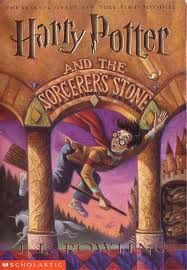 I don’t know if this is a universal opinion or not, but I LOVED the series debut, Harry Potter and the Sorcerer’s Stone. I loved being introduced to the magical world alongside Harry. I mean, is there any better fantasy than being horribly mistreated and unloved all your life, then suddenly finding out how special and important you are? Poor Harry is abominably treated by the Dursleys, who I loathe with every ounce of myself. And then, glorious Hagrid shows up and whisks Harry away to learn about pictures that move, Quidditch, chocolate frogs that jump, and of course Hogwarts. And Harry finally gets friends! Just totally heartwarming and exciting.
I don’t know if this is a universal opinion or not, but I LOVED the series debut, Harry Potter and the Sorcerer’s Stone. I loved being introduced to the magical world alongside Harry. I mean, is there any better fantasy than being horribly mistreated and unloved all your life, then suddenly finding out how special and important you are? Poor Harry is abominably treated by the Dursleys, who I loathe with every ounce of myself. And then, glorious Hagrid shows up and whisks Harry away to learn about pictures that move, Quidditch, chocolate frogs that jump, and of course Hogwarts. And Harry finally gets friends! Just totally heartwarming and exciting.
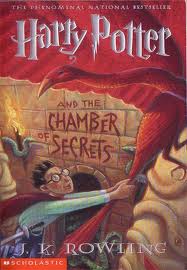 I’m currently on the last 30 or so pages of the second book in the Harry Potter series, Harry Potter and the Chamber of Secrets. I like this one too, though not as much, and I can’t tell if that’s because I owned the movie adaptation of this book and have seen it a hundred times, so maybe I’m just bored with it? Or, because of the snakes. I have a terrible, terrible phobia of snakes, and the creepiness of the basilisk just squick me out. It reminds me of a news story I read a few years ago about how scientists had found a prehistoric skeleton of a snake the size of a bus. A BUS. I think I still have the creepy crawlies from reading that.
I’m currently on the last 30 or so pages of the second book in the Harry Potter series, Harry Potter and the Chamber of Secrets. I like this one too, though not as much, and I can’t tell if that’s because I owned the movie adaptation of this book and have seen it a hundred times, so maybe I’m just bored with it? Or, because of the snakes. I have a terrible, terrible phobia of snakes, and the creepiness of the basilisk just squick me out. It reminds me of a news story I read a few years ago about how scientists had found a prehistoric skeleton of a snake the size of a bus. A BUS. I think I still have the creepy crawlies from reading that.
I’m looking forward to the next book in the series, Harry Potter and the Prisoner of Azkaban, which I remember being my favorite. Maybe I should do a simultaneous watch-along with the movies as well? That way, I’d be able to see Gary Oldman, who plays Sirius, soon. Nothing wrong with that!
Follow My Lead by Kate Noble
5 JulOk, time to attack my already-read pile and get another review done! This time it’s Kate Noble’s Follow My Lead, which I picked up at my favorite paperback store. I always squee a little when one of my favorite, not-so-readily-available authors has a book in this particular store, as this place is VERY popular with the local bibliophiles and things get snapped up quick. Kate Noble is one of these authors – she’s newer and has a lot of buzz, so to find Follow My Lead was nothing short of amazing. The gods of romance reading were smiling down on me that day. I’d already read Summer of You and Compromised (which I don’t think I reviewed) and so was excited to start another of Noble’s romances.
I love, love, love stories about female scholars. That mix of bluestocking charm and tidbits about Egyptology/art history/whatever subject the particular lady scholar is into are so entertaining to me. Winifred Crane is quite an accomplished art historian, but nobody knows it – that’s because she’s published her papers under a false, male name. When she decides to approach London’s tony (and female-unfriendly) Historical Society for membership, she is rebuffed and good. Not aiding her at all is a particularly odious cousin who intends to marry her and is of that ever-so-irritating opinion that women should be polite, quiet, and contain their efforts to child-rearing and attending their husbands. Charming, no? Also present at Winifred’s rejection by the Historical Society is Jason Cummings, Duke of Rayne, who appeared as the extremely irritating brother in Summer of You. Full disclosure: I loathed Jason in that book, but I tried not to let that color my opinion of him in this one. Jason is very busy with his dukedom, very proper, and actually wants to get married to Sarah Forrester, a perfectly charming young lady of the ton. (I loved that Noble made Winn’s rival completely and totally lovable and worthy – it felt very realistic to have Jason torn between the two women, and I’m looking forward to reading her story in If I Fall, released this past April.) Through chivalry, curiosity, and a little bit of boredom, Jason agrees to a far-fetched plan to allow Winn to prove her claims to the Historical Society by determining the origin of a contested painting. This plan leads to hidden identities, double crossings, madcap chases across Europe, and of course, love.
There were parts of this book I very much liked, and others that either tested my suspension of disbelief or just weren’t my bag. I really liked Winn – what a resourceful, strong, and brave heroine. But, and this is a big but, her attitude/relationship with her cousin was completely beyond my understanding. The man is a twerp of the worst kind, constantly belittling her ambitions and trying to keep her in the little box he’s decided she should be in. For such an intelligent and, frankly, independent woman to put up with this for reasons that I felt were unworthy of her really tested my patience. I don’t always have to like my heroines, but I do prefer to understand them, and in this respect, I just thought she was cray cray. I mentioned above my dislike of the hero due to his role in another book, but I thought he came off well here. It’s been a few years, and he’s not only mended his relationship with his sister, but he’s owned up to his responsibilities and no longer runs away or buries his head in the sand in the face of unpleasantness. That being said, for all his nice qualities, I didn’t get much oomph from him. He is very kind, even when Winn demonstrates an aggravating ability to ditch him, but he was pretty beta. Winn and Jason’s relationship develops nice and slowly, giving themselves, and us by extension, a good amount of time to get to know them, but I never felt any real heat. They seemed like fantastic companions, best friends even, but I didn’t get that “true love” vibe. Actually, maybe that’s a nice change-up – these two characters would probably get on very well together, having a lot of adventures and supporting each other. Maybe I’m just jaded that these nice, mellow relationships don’t thrill me as much as the more angsty ones? I do want to say that the ending is just lovely, so sweet and well-written. I do love me some Kate Noble – she’s a fantastic writer and able to keep my engrossed even when I’m not completely on board with the characters. I’m really looking forward to the next one.
Two DNFs: this pains me
20 Jun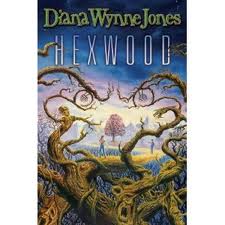 First up, I tried to read Dianna Wynne Jones’ Hexwood. I hadn’t heard of this particular title of hers, but I’ve come to really respect and enjoy her weird world. I mean, Howl’s Moving Castle is a phenomenal book (which incidentally became one of my favorite movies) and I recently read and enjoyed House of Many Ways (which it looks like I didn’t review…curious), so I thought for sure anything I picked up from Jones would be a winner for me. Plus, with her recent passing in 2011, it feels really wrong to not have a glowing review for any of her works. Alas, I didn’t like Hexwood and gave it up after 100 pages or so. It was just too odd and unstructured for me right now. It’s about a motley crew of characters from different times, places, and dimensional realms who interact with each other in an enchanted world. Because I didn’t finish it, I don’t know how it all worked out or what significance each character had, and I can see in hindsight that it’s a very intelligent book that I probably would have enjoyed another time. Now, though, the jolts in time and space were too disorienting for me, and I had trouble caring about any of the characters. One of the blurbs on the cover, from The Washington Post, said it’s a “an intricate mesh of romance, science fiction, mythology, and rite of passage.” Sounds amazing, but didn’t work for me. I’m going to hold onto it and give it another chance later on.
First up, I tried to read Dianna Wynne Jones’ Hexwood. I hadn’t heard of this particular title of hers, but I’ve come to really respect and enjoy her weird world. I mean, Howl’s Moving Castle is a phenomenal book (which incidentally became one of my favorite movies) and I recently read and enjoyed House of Many Ways (which it looks like I didn’t review…curious), so I thought for sure anything I picked up from Jones would be a winner for me. Plus, with her recent passing in 2011, it feels really wrong to not have a glowing review for any of her works. Alas, I didn’t like Hexwood and gave it up after 100 pages or so. It was just too odd and unstructured for me right now. It’s about a motley crew of characters from different times, places, and dimensional realms who interact with each other in an enchanted world. Because I didn’t finish it, I don’t know how it all worked out or what significance each character had, and I can see in hindsight that it’s a very intelligent book that I probably would have enjoyed another time. Now, though, the jolts in time and space were too disorienting for me, and I had trouble caring about any of the characters. One of the blurbs on the cover, from The Washington Post, said it’s a “an intricate mesh of romance, science fiction, mythology, and rite of passage.” Sounds amazing, but didn’t work for me. I’m going to hold onto it and give it another chance later on.
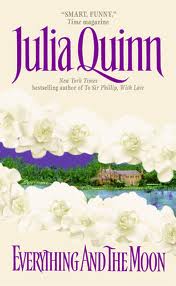 Next DNF for me was Julia Quinn’s Everything and the Moon. Quinn is a romance author that I usually love and can depend on for light romantic fare. She admittedly mentions in her forward that she tried a different tack for this book – she had the h/h fall in love at first sight as teenagers. He’s an earl-to-be, she’s a vicar’s daughter, and their star-crossed love follows the predictable path of heartbreak at first. Quinn seemed skeptical in her ability to pull off the “love at first sight” trope, and like her, it’s not my favorite plot twist either. I just…don’t get it. Attraction, yes. Chemistry, definitely. “I love you with my whole soul and can’t imagine being apart from you” after the first meeting? I don’t buy it, and couldn’t. Because I didn’t believe in their connection and hadn’t really bought in to their love, the resulting plot twists didn’t do much for me. Robert, the hero, is a huge dick to the heroine after the Big Misunderstanding, which is understandable but just grated on my nerves. Victoria, the heroine, manages her disappointment well, in a Jane Eyre, “I will survive” kind of way that I liked. BUT. She inexplicably (to my mind, at least) digs her heels in at a certain point and it really slowed down the development of their relationship and the storyline for me. I eventually lost interest when I realized I didn’t care enough about either of them to see how they ended up. Just wasn’t for me. Still, this is the first of her books that didn’t really grab me, so I’m just writing it off as a fluke.
Next DNF for me was Julia Quinn’s Everything and the Moon. Quinn is a romance author that I usually love and can depend on for light romantic fare. She admittedly mentions in her forward that she tried a different tack for this book – she had the h/h fall in love at first sight as teenagers. He’s an earl-to-be, she’s a vicar’s daughter, and their star-crossed love follows the predictable path of heartbreak at first. Quinn seemed skeptical in her ability to pull off the “love at first sight” trope, and like her, it’s not my favorite plot twist either. I just…don’t get it. Attraction, yes. Chemistry, definitely. “I love you with my whole soul and can’t imagine being apart from you” after the first meeting? I don’t buy it, and couldn’t. Because I didn’t believe in their connection and hadn’t really bought in to their love, the resulting plot twists didn’t do much for me. Robert, the hero, is a huge dick to the heroine after the Big Misunderstanding, which is understandable but just grated on my nerves. Victoria, the heroine, manages her disappointment well, in a Jane Eyre, “I will survive” kind of way that I liked. BUT. She inexplicably (to my mind, at least) digs her heels in at a certain point and it really slowed down the development of their relationship and the storyline for me. I eventually lost interest when I realized I didn’t care enough about either of them to see how they ended up. Just wasn’t for me. Still, this is the first of her books that didn’t really grab me, so I’m just writing it off as a fluke.
So there you have it. I’m trying a different tack now by delving into some non-fiction I’ve gotten from the library. I’m working on Gabrielle Hamilton’s Blood, Bones, & Butter, a chef memoir that I mentioned a few months ago. So far, I’m really liking it, not just because I love food and spent a fair portion of my working life in various restaurants, but also because homegirl is an excellent writer. Wicked combo. Then I’ll get to a gardening memoir by Margaret Roach – I’ve recently begun cultivating my smallish patch of dirt in my yard and am super into it. Yay for growing things!
Multiple review: two romances and a space opera
15 Jun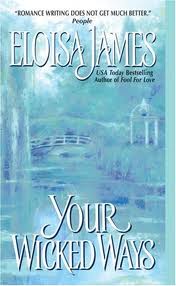 Your Wicked Ways by Eloisa James. This was a really unusual book, I thought, and it further cemented my opinion that Eloisa James is a must-read author. Not only does she write tight plot, fantastic dialogue, and nontraditional characters, but she always surprises me with how she turns the romance genre on its head. In Your Wicked Ways, Helene, the Countess Godwin, and her husband, Rees, Earl of Godwin, have been separated for ten years. They had an impromptu elopement fueled by infatuation, entertained the bare minimum of time together, and swiftly parted. Not so unusual for a romance, right? However! Rees is not your typical hero – he’s an ass. Not in an alpha, I’m-so-tough way, but in a rude, insensitive, and thoughtless way. It took me a looooong time to like him, mostly because the first fifty pages or so, he is unbelievably cruel to Helene. Rees decided to descend into total immorality after his marriage failed, kicking Helene out and replacing her with a mistress in her bedroom. Helene, meanwhile, retreated into propriety and stiffness, and has become a brittle matron incapable of fun. The reasons they come back together benefit both of them, and it takes a lot of time before either of them learn how to love another person. (Scandalous: Rees is actually terrible in bed! Never have I encountered a romantic hero who had to learn his bedroom skillz, so that was very different).
Your Wicked Ways by Eloisa James. This was a really unusual book, I thought, and it further cemented my opinion that Eloisa James is a must-read author. Not only does she write tight plot, fantastic dialogue, and nontraditional characters, but she always surprises me with how she turns the romance genre on its head. In Your Wicked Ways, Helene, the Countess Godwin, and her husband, Rees, Earl of Godwin, have been separated for ten years. They had an impromptu elopement fueled by infatuation, entertained the bare minimum of time together, and swiftly parted. Not so unusual for a romance, right? However! Rees is not your typical hero – he’s an ass. Not in an alpha, I’m-so-tough way, but in a rude, insensitive, and thoughtless way. It took me a looooong time to like him, mostly because the first fifty pages or so, he is unbelievably cruel to Helene. Rees decided to descend into total immorality after his marriage failed, kicking Helene out and replacing her with a mistress in her bedroom. Helene, meanwhile, retreated into propriety and stiffness, and has become a brittle matron incapable of fun. The reasons they come back together benefit both of them, and it takes a lot of time before either of them learn how to love another person. (Scandalous: Rees is actually terrible in bed! Never have I encountered a romantic hero who had to learn his bedroom skillz, so that was very different).
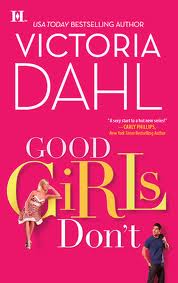 Ok, next up is Victoria Dahl’s Good Girls Don’t. I think Victoria Dahl is always reliable for a scorcher, and though I liked this one, it wasn’t as good as my favorite of her books, Lead Me On. Dahl excels at believable chemistry and she doesn’t disappoint here. What got in my way was the family dynamics. Lemme sum up: Tessa Donovan runs her family’s brewery along with her two brothers, Eric and Jamie. Eric is the de-facto head of the family after her parents died, and Jamie is the ne’er-do-well, charming rogue. There is A LOT of built-up tension and issues in this family, almost too much to be contained. Tessa is a pleaser, willing to lie, cheat, and steal (not really, but almost) to keep her brothers happy. Detective Luke Asher is a local cop who is called in to investigate a robbery at the brewery. What I liked with their relationship is there wasn’t a lot of beating around the bush – they meet, they’re attracted, they go on a date. What gums up the process is the interference of Tessa’s brothers and Luke’s own backstory. Essentially, this is a story about how emotional baggage from your past will catch up with you. For me, her brothers’ constant fighting was stressful and Tessa’s reactions and counter-reactions bordered on manic and self-defeating. I kept wanting to tell Luke it just wasn’t worth it. Why don’t book characters listen to me? I don’t know, I still liked it, but it did strain my nerves at times.
Ok, next up is Victoria Dahl’s Good Girls Don’t. I think Victoria Dahl is always reliable for a scorcher, and though I liked this one, it wasn’t as good as my favorite of her books, Lead Me On. Dahl excels at believable chemistry and she doesn’t disappoint here. What got in my way was the family dynamics. Lemme sum up: Tessa Donovan runs her family’s brewery along with her two brothers, Eric and Jamie. Eric is the de-facto head of the family after her parents died, and Jamie is the ne’er-do-well, charming rogue. There is A LOT of built-up tension and issues in this family, almost too much to be contained. Tessa is a pleaser, willing to lie, cheat, and steal (not really, but almost) to keep her brothers happy. Detective Luke Asher is a local cop who is called in to investigate a robbery at the brewery. What I liked with their relationship is there wasn’t a lot of beating around the bush – they meet, they’re attracted, they go on a date. What gums up the process is the interference of Tessa’s brothers and Luke’s own backstory. Essentially, this is a story about how emotional baggage from your past will catch up with you. For me, her brothers’ constant fighting was stressful and Tessa’s reactions and counter-reactions bordered on manic and self-defeating. I kept wanting to tell Luke it just wasn’t worth it. Why don’t book characters listen to me? I don’t know, I still liked it, but it did strain my nerves at times.
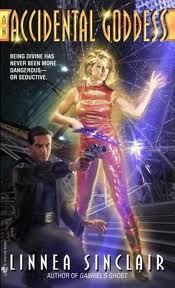 Space opera time! I love me a good space opera – they’re like a crackishly addicting form of science fiction, dystopia, and romance. Linnea Sinclair is mega awesome at this genre, and I’m constantly searching for her backlist. Accidental Goddess was one that I hadn’t heard of, but I loved it. Gillaine Davre is a captain in the Raheiran Special Forces when a last-ditch battle maneuver rockets her forward in time 300 years. That’s scary enough, but she soon realizes after waking up on an unknown space station that her desperate move 300 years ago has turned her into a deity to the modern culture. Admiral Rhys Makarian doesn’t know what to do with this odd, injured traveler but he knows he doesn’t trust her. Soon Gillie realizes that her presence in the future isn’t a mistake, and she’s got to figure out how to save the world and her new relationship at the same time. Fantastico! Totally over the top and fun. I loved the slow, mature relationship they developed, and for once, their relationship hangups seemed justified rather than infuriating.
Space opera time! I love me a good space opera – they’re like a crackishly addicting form of science fiction, dystopia, and romance. Linnea Sinclair is mega awesome at this genre, and I’m constantly searching for her backlist. Accidental Goddess was one that I hadn’t heard of, but I loved it. Gillaine Davre is a captain in the Raheiran Special Forces when a last-ditch battle maneuver rockets her forward in time 300 years. That’s scary enough, but she soon realizes after waking up on an unknown space station that her desperate move 300 years ago has turned her into a deity to the modern culture. Admiral Rhys Makarian doesn’t know what to do with this odd, injured traveler but he knows he doesn’t trust her. Soon Gillie realizes that her presence in the future isn’t a mistake, and she’s got to figure out how to save the world and her new relationship at the same time. Fantastico! Totally over the top and fun. I loved the slow, mature relationship they developed, and for once, their relationship hangups seemed justified rather than infuriating.
So there you have it, peeps. Three quick-and-dirty reviews, and my pile is now smaller! Hurray for small triumphs! Now, off I go to frolic in the sunshine.

